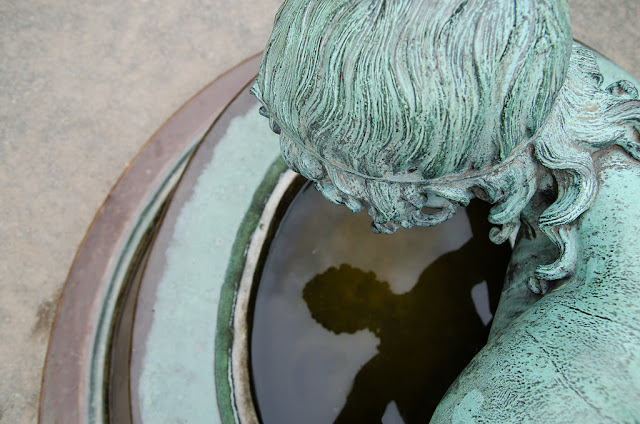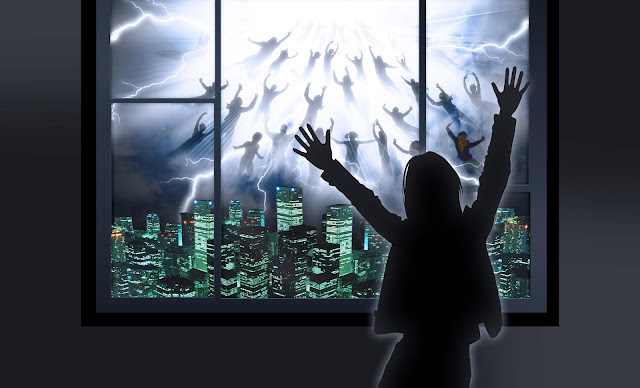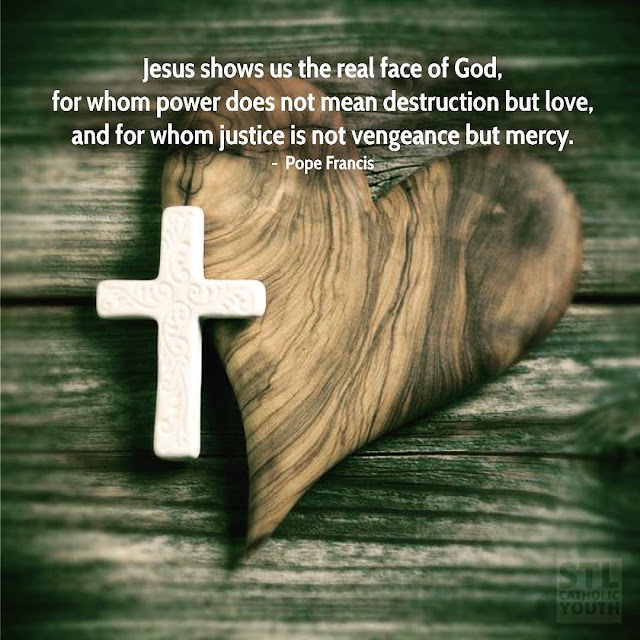When Mercy Leaves Church

"I often wonder if religion is the enemy of God” Irish Rockstar Bono, of U2 fame, once said. “It's almost like religion is what happens when the Spirit has left the building." 1
I think he’s right. Without the Holy Spirit, religion becomes a way to prove ourselves righteous – as by memorizing scripture, acting pious, and thinking we’re better than others. It’s an easy way to hide a sense of not really being good enough – i.e., our shame.
That’s exactly what Adam and Eve did when they covered themselves with fig leaves and hid from God, rather than face the naked truth that they trusted the Serpent instead of Him. Since then, hiding our shame has become part of our human nature. Like those fig leaves, religion often covers our shame and guilt – our nakedness before God – so we can pretend that we’re really okay and in control.
FROM CONFESSION TO COMPASSION
The authentic way to overcome shame—and not just hide it—is simply confession, that is by acknowledging our sin and crying out to Jesus for mercy. Here’s the good news: Not only does confession take the burden of sin off your heart, but in fact, receiving his mercy enables you to feel compassion for others in need and to act with mercy toward them (2 Corinthians 1:3-14).
The authentic way to overcome shame—and not just hide it—is simply confession, that is by acknowledging our sin and crying out to Jesus for mercy. Here’s the good news: Not only does confession take the burden of sin off your heart, but in fact, receiving his mercy enables you to feel compassion for others in need and to act with mercy toward them (2 Corinthians 1:3-14).
That’s why Jesus harshly rebukes religious leaders who promote religious law but “ignore the more important aspects of the law—justice, mercy, and faith” (Matthew 23:23; 1-39).
His words reflect a similar exhortation from the ancient prophet Micah: “And what does the LORD require of you? To act justly and to love mercy and to walk humbly with your God” (Micah 6:7).
It’s tough to translate these words into deeds! In order to “walk the walk” in this journey of faith, we need mercy.
James warns that “judgment without mercy will be shown to anyone who has not been merciful” (James 2:13 NIV). Thus, he further emphasizes that deeds are essential to authentic faith. It’s not that works save us, but rather that faith becomes tangible only when we demonstrate mercy through our good deeds for others (James 2:14-26).
So, an important question remains challenging the church today: What happens when mercy leaves the building--indeed, the church, or the nation?
Unfortunately, I think we’re seeing the answer among us today.
Without mercy, we become self-absorbed. Without mercy, we become callous to the pain of others and the needy see no justice. Without mercy, we lack godliness. In fact, this heartlessness signals the last days: “…in the last days there will be very difficult times. For people will love only themselves and their money. They will be boastful & proud …ungrateful …unloving & unforgiving; they will slander others…be cruel and hate what is good. They will betray their friends, be reckless, be puffed up with pride, and love pleasure rather than God. They will act religious, but they will reject the power that could make them godly” (2 Timothy 3:1-5 NLT).
Sadly, in the last days, there will be no mercy. Yes, there will be religion, but the Spirit of Mercy will have left the church. I don’t know about you, but I find that downright scary!
You might think that you’ll be raptured before that happens but remember that James said: “There will be no mercy for those who have not shown mercy to others” (James 2:13 NLT).
Uhh -- good luck with that rapture/rescue fantasy then! There’s no get-out-of-jail card without mercy!
On the other hand, Mercy is the power that makes us godly.
SPIRITUAL DISEASE
Addressing the Pontifical Academy for Life, Pope Francis recently said narcissism is a spiritual disease that currently blinds people to the challenges and struggles of others.
If we exclude “the other” from our thinking, our lives become self-centered and a mere consumer commodity. Narcissus, who in ancient mythology loved only himself and ignored the good of others, is foolish but does not realize it. In a way, he is the source of that contagious spiritual virus that turns us into reflections in a mirror who see ourselves alone and nothing else. We become blind to life and its power – to life as a gift received from others, a gift that in turn must be passed on responsibly.2Narcissistic Personality Disorder is characterized in The Diagnostic and Statistical Manual of Mental Disorders (DSM-5) by a pervasive pattern of grandiosity, preoccupation with success/power, perceived superiority, a need for admiration, a sense of entitlement, exploitative behavior, and lack of empathy.3
When Christians claim that they are called to control the seven major spheres of influence in society [1. Education, 2. Religion, 3. Family, 4. Business, 5. Government/ Military, 6. Arts/ Entertainment, 7. Media] while simultaneously dismissing the needs of the oppressed, we need to recognize such insatiable hunger for dominion as narcissism and not Christianity.4
As Scripture says, “But whoever has the world's goods, and sees his brother in need and closes his heart against him, how does the love of God abide in him?” (1 John 3:17).
Loving self, power, and money without mercy toward others is narcissism, the very opposite of mercy.
Narcissism particularly appeals to a highly individualistic society like the United States rather than communal cultures. Moreover, studies show that churches attract narcissist personality types into positions of ministry to gratify the narcissist’s drive for power and approval while enabling them to hide their own sins.5
It’s one big fig leaf!
Add to this mix a culture of capitalism, a doctrine of prosperity, the rise of celebrity pastors, mega-churches and pop evangelism, and narcissism runs amok in American churches.
In the absence of mercy for the real needs of others,
the church sounds hollow expressing concern
only about people's spiritual salvation.
only about people's spiritual salvation.
Such spiritualizing becomes a pretense for compassion at best, and hypocrisy at worst. We can’t pretend to be concerned about souls when we’re not concerned about bodies.
If we turn our backs to the plight of the homeless on our streets, the refugee seeking asylum, the sick needing healthcare, and children separated from their parents, how can we call ourselves the Body of Christ? Christ laid down his body for us and calls us to do the same for others. “We know what love is because Jesus gave his life for us. This is why we must give our lives for each other” (I John 3:16 CEV).
Narcissism, then to paraphrase Bono, is what happens when mercy leaves the building.
Narcissism becomes systemic and cultist when leaders simply want to satisfy their own self-interests rather than minister to the needs of others. Consequently, hearts can easily become hardened to all the unresolved problems in the world.
Since following celebrity leaders minimizes shame, leaders are often not held accountable. In the wake of #MeToo and #ChurchToo, political leaders, media celebrities, and mega-church pastors have been accused of abuse of power, sexual harassment or personal transgressions. Power without mercy creates victims of power abuse.
MERCY
TRIUMPHS OVER JUDGMENT
However, Jesus demonstrated the power of mercy to lift people up when he healed the sick, cleansed the lepers, drove out demons, and forgave the sinner. That’s the real Body of Christ.
So, what can we do?
First, recognize false religion. True religion embraces those in need of mercy. The widow, the orphan, the elderly, the sick, the poor, and the child are all noted in scripture as people deserving of mercy. Since they're often helpless in advocating for themselves, Jesus always advocates for them (James 1:27; Leviticus 19:32; Matthew 10:8; Proverbs 31:8-9; Matthew 18:4-6).
Second, don't depend on spiritual gurus. Seek Holy Spirit insight through your own individual biblical study and research along with ongoing prayer, self-examination, and personal confession. Stop playing follow-the-leader and chasing every prophet, miracle worker, or luminary that comes to town or has a reality TV show.
So, what can we do?
First, recognize false religion. True religion embraces those in need of mercy. The widow, the orphan, the elderly, the sick, the poor, and the child are all noted in scripture as people deserving of mercy. Since they're often helpless in advocating for themselves, Jesus always advocates for them (James 1:27; Leviticus 19:32; Matthew 10:8; Proverbs 31:8-9; Matthew 18:4-6).
Second, don't depend on spiritual gurus. Seek Holy Spirit insight through your own individual biblical study and research along with ongoing prayer, self-examination, and personal confession. Stop playing follow-the-leader and chasing every prophet, miracle worker, or luminary that comes to town or has a reality TV show.
Third, pray to see others as Jesus
sees them. In a needy world, we can easily
become callous to misfortune and suffering. So, we need the eyes of Jesus: "When he saw the multitudes, he was
moved with compassion on them, because they were harassed and helpless" (Matthew
9:36). Pray for God’s healing to soften our hardness of heart, so that we can
recognize other’s needs, and like Jesus, we can act on their behalf.
Finally, recognize your own narcissistic wounding. At some time in your own life, usually in childhood, you may have been shamed or disgraced in such a way that you feel inferior. Maybe your parents weren’t emotionally available to you, or maybe they punished you harshly. Maybe you were bullied or snubbed in school. Whatever! Jesus can heal those wounds if you cry out to Him for healing.
We don’t need to hide behind celebrity pastors, political leaders, or fig leaves to feel validated.
You can enter into God’s presence just as you are! His grace and mercy are sufficient for you. You don’t need to perform or to pretend; you can be real!
Only when we have experienced that kind of mercy are we truly empowered to be merciful to others and share Good News.
Finally, recognize your own narcissistic wounding. At some time in your own life, usually in childhood, you may have been shamed or disgraced in such a way that you feel inferior. Maybe your parents weren’t emotionally available to you, or maybe they punished you harshly. Maybe you were bullied or snubbed in school. Whatever! Jesus can heal those wounds if you cry out to Him for healing.
We don’t need to hide behind celebrity pastors, political leaders, or fig leaves to feel validated.
You can enter into God’s presence just as you are! His grace and mercy are sufficient for you. You don’t need to perform or to pretend; you can be real!
Only when we have experienced that kind of mercy are we truly empowered to be merciful to others and share Good News.
https://www.u2.com/news/article/1060/
2. ADDRESS
OF HIS HOLINESS POPE FRANCIS TO PARTICIPANTS IN THE PLENARY ASSEMBLY OF THE PONTIFICAL ACADEMY FOR LIFE; 25
June 2018. https://w2.vatican.va/content/francesco/en/speeches/2018/june/documents/papa-francesco_20180625_accademia-provita.html
3. THE DIAGNOSTIC AND STATISTICAL MANUAL OF MENTAL DISORDERS, American Psychiatric Association; Fifth Edition, 2013. http://www.psi.uba.ar/academica/carrerasdegrado/psicologia/sitios_catedras/practicas_profesionales/820_clinica_tr_personalidad_psicosis/material/dsm.pdf
4. “What Is The Seven-Mountain Mandate, And Is It
Biblical?”
5. "Clergy and Narcissistic Personality Disorder,"
FREQUENCY OF NARCISSISTIC PERSONALITY DISORDER IN PASTORS: A PRELIMINARY STUDY
A Paper Presented to the American Association of Christian Counselors
Nashville, TN September 26, 2015.
6. "This is What Really Makes Narcissists Tick"











Comments